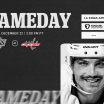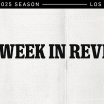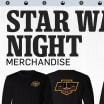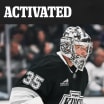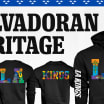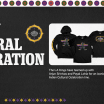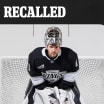In honor of the franchise's 50th anniversary, this is the first in a series of 50 forgotten Kings stories. Going beyond the classic, well-worn tales, this series is for the die-hard fans…who thought they knew everything about their favorite team.
"The bidding for Los Angeles' major league hockey franchise is beginning to look like a rush for the last knothole at a nudist camp." (Roberts, Rich. "NHL Interest Sky High-$312,625 Worth." Independent Press-Telegram, January 16, 1966.)
50 Forgotten Stories: It was almost the LA Blades
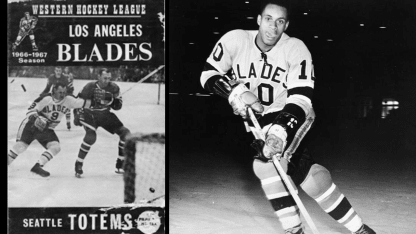
By
Sheng Peng @Sheng_Peng
Five bold parties put it all out when the NHL opened bidding for the fledgling Los Angeles franchise which was set to debut in 1967-68: LA Blades owner Dan Reeves, Lakers owner Jack Kent Cooke, Buffalo Bills owner Ralph Wilson, TV producer Tony Owen and media conglomerate Metromedia.
Eventual winner Cooke was not considered the favorite then. Initially, The Hockey News publisher Ken McKenzie (no relation to Bob) believed the Blades, who skated in the professional iteration of the Western Hockey League, held the edge.
After all, they had already established a beachhead for pro hockey in Los Angeles in 1961. With Reeves, who also owned the Rams, and Dan Martin, who was Under Secretary of Commerce for both Presidents John F. Kennedy and Lyndon B. Johnson, they boasted respectable ownership.
Perhaps most importantly, they were the NHL bidder of choice for the Coliseum Commission, who owned The Sports Arena, which at the time was the only viable local building for a professional hockey team. Also in the Blades' back pocket? The threat of a lawsuit, as they believed in both their territorial claims over the Los Angeles area and that the NHL had previously promised them expansion rights.
McKenzie, however, reversed his opinion after a trip out West. "I don't think they've done a good job in the years they have been here.
"They're in last place with the biggest city in the league and their attendance hasn't been built up. To me, this points to poor management." (Roberts, Rich. "Poor Crowds, Record May Hinder Blades' NHL Bid." Independent Press-Telegram, February 6, 1966.)
Indeed, the Blades were only averaging a few thousand a game and had missed the playoffs in consecutive seasons.
"A lot of the people in the East think that Tony Owen will get it, simply because he's a local and has no other conflicting interests," offered McKenzie. He never gave Wilson a shot, "The NHL stresses local ownership and doesn't like its owners to have other sports interests."
But Cooke undercut his competition by promising to erect a brand-new hockey arena out of his own pocket. Montreal Canadiens President David Molson admitted, "You have to be impressed with anyone who offers to build a new building." (Hafner, Dan. "Cooke to Build Arena if He Gets NHL." Los Angeles Times, February 9, 1966.)
The Blades weren't done fighting, though. After all, they had a 1966-67 campaign to play out and the hope that Cooke couldn't follow through on his building pledge.
So they hired heretofore favorite Tony Owen as Team President. They signed a three-year Sports Arena lease with the Coliseum Commission, closing off a potential backdoor for Cooke. And each WHL member franchise agreed to give the Blades a significant roster player to help pull LA out of the cellar.
New Blades head coach Fern Flaman was giddy, "I have until Sept. 30 to pick them. Since they can protect only five guys, I'm sure I'll be able to get whoever I need by then." (Roberts, Rich. "Summer School Opens for Blades Today." Independent Press-Telegram, September 18, 1966.)
Owen, pointing out that Cooke's Inglewood arena site was still just an empty lot, asserted, "The way money is today he can't do it. Even if he could do it on his own he'd be foolish. That's $19 million." (Roberts, Rich. "Big Man Missing as Blades Begin Drills." Independent Press-Telegram, September 20, 1966.)
But just as swiftly, the Blades' hopes were slashed. The other WHL clubs were reluctant to honor their unusual player-gifting arrangement. There was no sign that Cooke's building plans were slowing down. Soon enough, Los Angeles city councilmen forced the Coliseum Commission to abandon their alliance with the Blades.
So in the Great American Tradition, they sued, but to no avail.
"The mind boggles at the desperate effort of these people," boomed Cooke. "It transcends my understanding." (Zimmerman, Paul. "Blades File Suit in Bid to Bar Cooke's Ice Team." Los Angeles Times, October 18, 1966.)
Yes, that's how Cooke normally spoke.
The Blades had blown their chance at the NHL. Instead, it would be Cooke's Kings who would go on to rule the Southern California hockey scene for the next 50 years.
This article was originally posted on Today's Slapshot.
Sheng Peng is a freelance hockey writer based out of Los Angeles, California. He covers the LA Kings and Ontario Reign for Today's Slapshot. His work has also appeared on VICE Sports, The Hockey News, and SB Nation's Jewels from the Crown.

